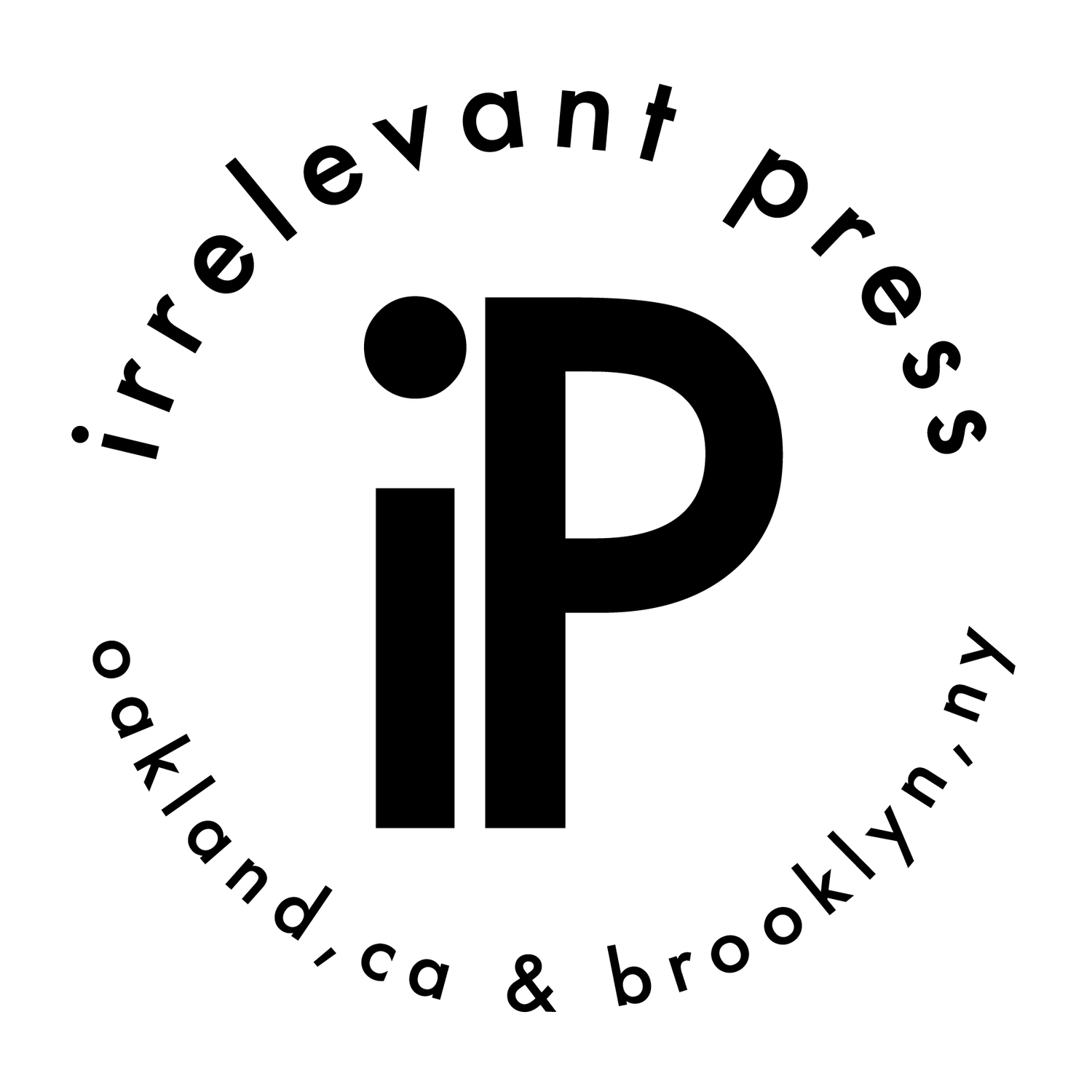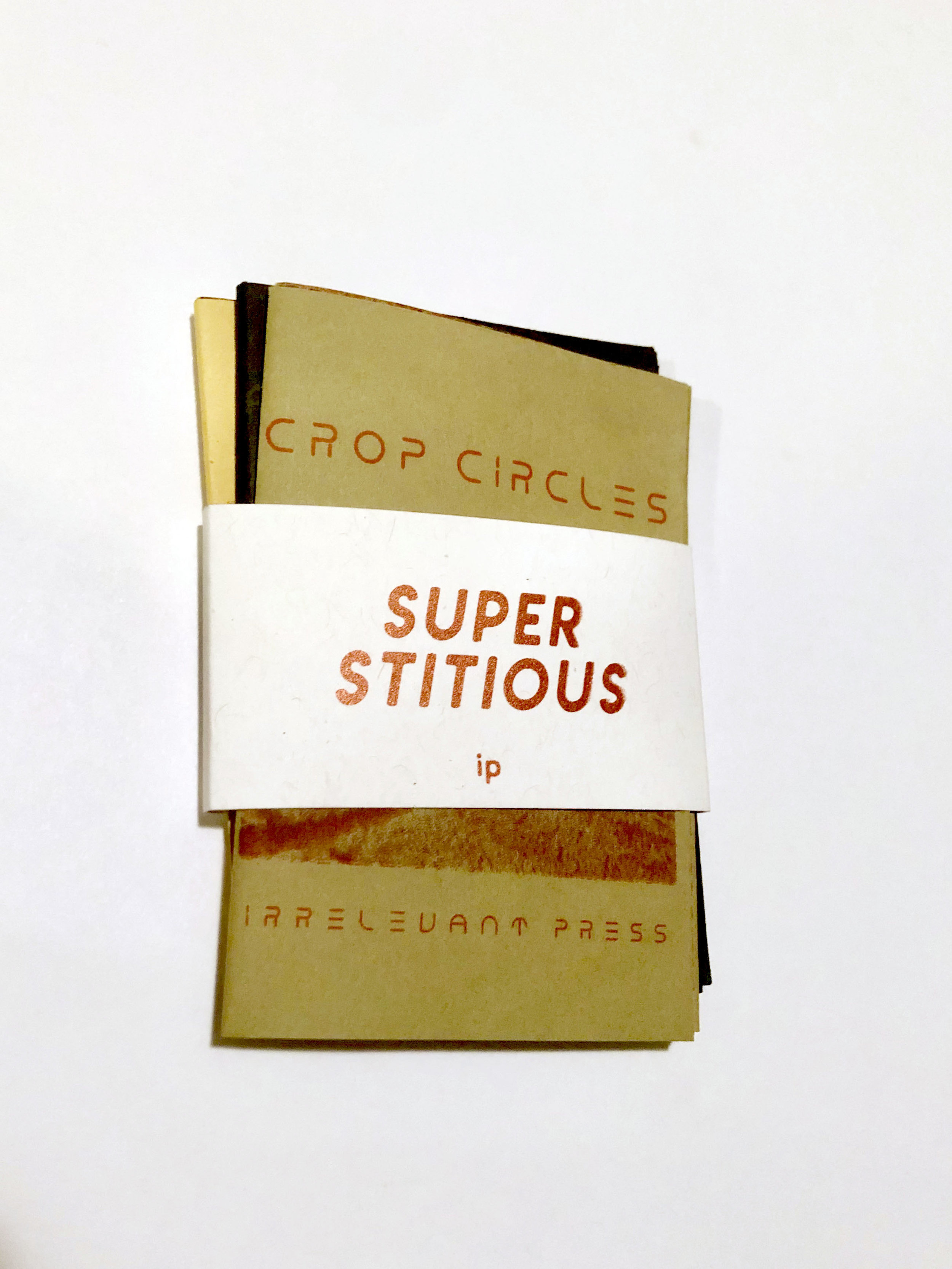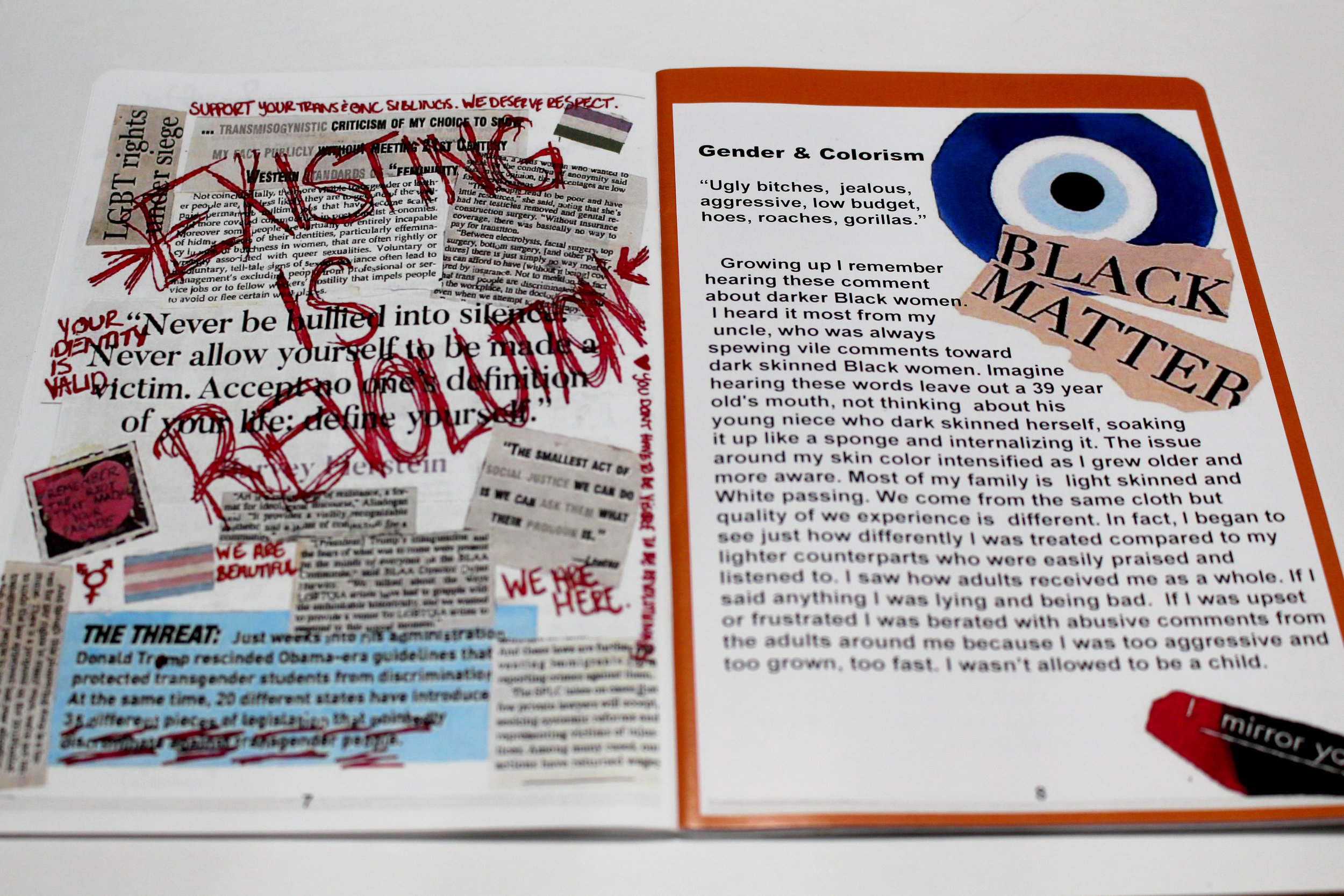UNPUBLISHED: An Interview with Irrelevant Press
I’m not sure how many of y’all have actually read our About page, but IP did in fact start five years ago at a Chevys in Emeryville, California after a pitcher of margaritas and an extensive food photoshoot.
Our first zine resulted in a (brief) copyright feud with an alt-lit icon on Twitter. Our first release party was thrown at a house that we were eventually priced-out of to make room for new-to-the-city Uber employees. Our first book fest functioned as a fundraiser for those lost and affected by a local tragedy. And our first interview was pulled from print because somebody lost their job.
We’ve worked with close to fifty artists on printing zines, have hosted parties at our favorite bookstore, collaborated on projects with so many friends, and fixed our risograph countless times (shouts out Mollie U).
We don’t have a store front for you to pick up your zines from and we can’t take on projects from Google that require hand-making 10,000+ books, but we love each other and zines and our fans so here’s a bit more about us if you’re interested.
Who comprises Irrelevant Press and how did the collective come to be?
Superstitious – Mollie Underwood.
Irrelevant Press is a collective of four queer women: Mollie Underwood, Lizz Carlton, Holly Meadows-Smith, and Sarah Burke. We started the press in 2014, inspired by our creative community in Oakland, California, and in need of an outlet for our own work, which at the time mostly lived in e-mail inboxes and locally-made zines.
Mollie is a professional printer, so she already had the knowledge and means to make zines; she was also writing poetry. Lizz was a post producer at an ad agency, looking to use her project management skills on more personally creative pursuits. Holly was writing and running a photography blog, while becoming increasingly interested in design. And Sarah was managing editor at the East Bay Express, but somehow made space for editing zines as well.
Initially, Irrelevant Press was focused on our own projects, which explore online existence, misogyny, pop culture, and pretty much everything else. As we grew more confident and experienced with zine printing, we started collaborating with artists beyond our collective. Sometimes this means working as a printing resource, offering design consulting, or distributing work that feels important to us. Holly and Sarah moved across the country to New York in the summer of 2017, so now the press is bicoastal and the work continues!
You publish your own material but also print and publish other people’s work. What’s your selection process?
We print work for the majority of people who reach out to us looking for simple saddle-stitch zine printing. For the most part, people have heard about us from artists we’ve worked with in the past. Our printing is cheaper than alternatives like Kinkos, and we offer guidance, when needed, for first-time zine makers. This makes each project collaborative and encourages newcomers.
For more complex projects, like perfect-bound books, we prioritize work made by, for, or about marginalized communities. We also get creative on pricing if a project falls within those bounds; working for trade, distributing the zine ourselves, or putting in IP funds if it makes sense.
QTPOC to the front, always!
Gender&: Vol. 1 – Era Steinfeld.
No – Hannah Rubin.
Notes on Survival – Alg.
Your collective is bicoastal (Oakland and New York); what are the pros and cons of being so far apart?
Your Side – Mollie Underwood.
On the plus side, we can act as a resource for more people and zines can be distributed on both coasts at bookshops and zine festivals. We are inspired by and exposed to more work and people in the zine community. It’s nice to be able to make IP HQ New York available as a space for Bay Area zine friends visiting town, too.
Some cons: our risograph and printing guru, Mollie, lives in the Bay Area, which complicates printing work but never prevents us from creating. It’s more difficult to collaborate and brainstorm via Facetime than in person, though, so our own work is slower. Plus there’s some serious FOMO when we know about events across the country that half of us can’t get to!
What was the New York Tech Zine Fair like? How did it stand out from the other fairs you've participated in?
The New York Tech Zine Fair was a totally different experience than other fairs. Most of the tablers were new to us, which was exciting but made us curious about where these folks were showing their work the rest of the time. Many of the participants were academics, pulling from their digital work on machine learning and artificial intelligence to create physical manifestations for the event.
As a collective, we’re very interested in the internet and have zines focused on online dating, tumblr, Craigslist, and Twitter, which is why we were selected to join their ranks for the zine fair. That said, other participants were much more knowledgeable about the technical details behind these platforms and had fantastic projects that were well beyond our understanding of technology. The organizers of the event, Mimi Onuoha and Taeyoon Choi, are researchers, and did an exceptional job curating. It was really motivating and inspiring.
What are some other independent presses or collectives you admire?
On the West Coast: Unity Press, Tiny Splendor, Oatmeal Magazine, Floss Editions, Undertone Collective, Night Diver Press, The Black Aesthetic, Shade Zine, Coloured Publishing, Neighborhood Comix, Mixed Rice Zines, Play Press, and Timeless, Infinite Light.
On the East Coast: The Bettyz, Homie House Press, Secret Riso Club, Raw Meat Collective, Endless Editions, 8 Ball, Press Press, unbag, Deadass Tho, Gender Fail, Spicy Zine, Yellow Jackets Collective, Perfectly Acceptable Press, Soft Surplus, Printjob Press, and 3Dot Zine.
And all of the artists and zinesters making work independently!
Internet culture is a wellspring of inspiration for your projects; was this something you decided collectively to address or were you already independently making work around it?
Irrelevant Press zines.
There was no conscious decision to focus on internet culture. As we all experimented with making our own work, the internet functioned (as it does for many) as a source of inspiration. We’re thinking of Tumblr and Instagram, specifically, as views into the work of other artists and writers we love.
Prior to forming the collective, most of us produced internet-centered works independently. Sarah wrote her college thesis on Facebook and the digital self, and Mollie and Holly both wrote about online dating and social media for various zines.
Being “online” is a big part of our lives, and something we’d been thinking about and discussing for years on a personal level. It made sense then, when we started working on collective projects, that we felt comfortable using it as a starting-off point.
Let's talk about the Kim Kardashian zine. How did this happen and what sparked your interest?
Mapping the Ambient Awareness of our Participatory Media – Holly Meadows-Smith
Like most of our works, this zine came about pretty organically. Holly was on Twitter the morning the news broke, the same headline—“BREAKING: Kim Kardashian Robbed at Gunpoint in Paris”—on every news source imaginable. She started taking screenshots just because it was a uniquely overwhelming experience. As the day wore on, however, she started to see a narrative unfold as the story became “Twitter discourse.” There was a conversation happening between media consumers (or Tweeters) and the media organizations.
Celebrities in general, and the Kardashian family specifically, have long been a topic of discussion on our group chat. At least three-quarters of us are fascinated by the lives of stars and follow certain people more closely than we should. In its final form though, the zine, Mapping the Ambient Awareness of our Participatory Media, was less about Kim Kardashian and more about digital social awareness, misogyny, and stardom. Using Kim as a focal point added to the allure, though, and has sparked intense reactions from readers. She is such a controversial figure that exploring online harassment and womanhood through her makes the work all the more interesting. But at the end of the day, when it comes to protecting people from rape and murder threats online, it shouldn’t matter what their name is or how much money they’ve earned.
What core beliefs or values is IP trying to convey?
The name Irrelevant Press was intended to emanate our interest in being open and malleable, and untethered to a genre, theme, or focus. While we gravitate toward internet culture as a collective, this has allowed us to collaborate on projects and imagine future work without constraint. That said, a mission of ours since we started collaborating with folks outside the collective has been to support voices and stories that aren’t often heard, whether this is for systemic reasons or because it’s someone’s first project. This has manifested in a few ways: the publishing of political content (an anti-Trump book, prison abolition pins); prioritizing projects by queer, trans, GNC, and POC folks; being flexible on pricing for certain projects and artists; offering support and consulting to new zinesters; and distributing other peoples’ work for them at zine events and online.
Irrelevant Press paper bag and a small plant.
What's one thing about zine culture you’d like to be rid of?
We want to be clear that we don’t feel like voices of the “zine scene.” There are people who have been around for far longer than us and have welcomed us into the culture with open arms! But, if we had to choose, we’d like to eliminate the idea that there’s any barrier to entry. If and when you’re comfortable sharing your work, you know how to work a printer, and you can steal a (long-arm) stapler from your work, you can make a zine and people will want to read it. We’d also love to see more zine fests, to eliminate competition for table space at the “hip”, high-traffic events that often get those media write-ups.
What other events or projects do you have coming up? Where can we follow IP?
(DISCLAIMER: this interview was originally conducted in January 2019)
We’ve finally wrapped up events for 2018! The year ended with our newly-released Mercury Retrograde calendar, which is always a group effort. Upcoming in 2019: Holly is working on a hive-mind travel guide and thinking about Tumblr and (unrelatedly) Kanye West. Mollie is working on a risographed knot-tying zine and developing a project on the trajectory of Moviepass. Lizz is looking to make more prints and some zines about plants. And Sarah will hopefully write something about Killing Eveas an addendum to a piece of professional writing she did this year.
We’ll be at a number of fests on both coasts in 2019. Some of our favorites are the New York Feminist Zine Fest, San Jose Zine Con, the Brooklyn Art Book Fair, and the East Bay Alternative Book and Zine Fest.
The best places to keep up and in touch with us are Instagram, Twitter, and our website.








